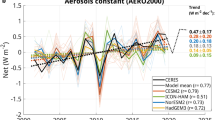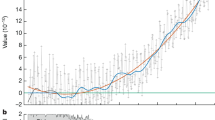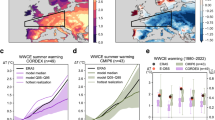Abstract
MEASUREMENTS of cosmic radiation at 40, 90 . and 200 sec. have been carried out recently in Britain, use directional aerial systems, and the observations at 40 and 90 Me. sec. have been confirmed ancLfetended to cover the full 360° of galactic longitudo various observers stationed in ships at other latitudes.
This is a preview of subscription content, access via your institution
Access options
Subscribe to this journal
Receive 51 print issues and online access
$199.00 per year
only $3.90 per issue
Buy this article
- Purchase on Springer Link
- Instant access to full article PDF
Prices may be subject to local taxes which are calculated during checkout
Similar content being viewed by others
References
Hey, J. S., Phillips, J. W., and Parsons, S. J., Nature, 157, 297 (1946).
Reber, G., Astrophys. J., 100, 279 (1944).
Greenstein, J. L., Henyey, L. G., and Keenan, P. C., Nature, 157, 806 (1946).
Author information
Authors and Affiliations
Rights and permissions
About this article
Cite this article
MOXON, L. Variation of Cosmic Radiation with Frequency. Nature 158, 758–759 (1946). https://doi.org/10.1038/158758a0
Issue Date:
DOI: https://doi.org/10.1038/158758a0
This article is cited by
-
Discrete Sources of Galactic Radio Frequency Noise
Nature (1948)
-
Variable Source of Radio Frequency Radiation in the Constellation of Cygnus
Nature (1948)
-
Die Kurzwellenstrahlung der Milchstra�e, der Sonne und des Mondes
Die Naturwissenschaften (1947)
Comments
By submitting a comment you agree to abide by our Terms and Community Guidelines. If you find something abusive or that does not comply with our terms or guidelines please flag it as inappropriate.



